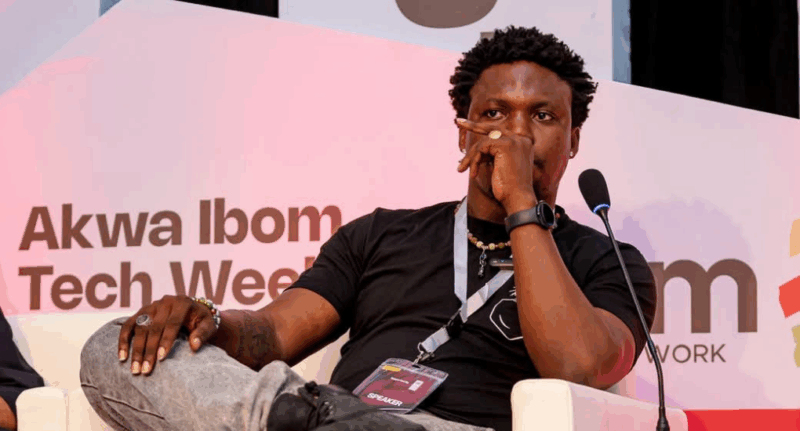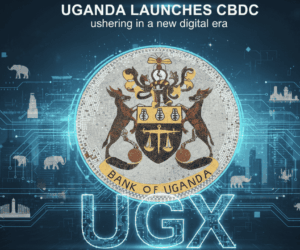From exiting his previous startups, Peniremit and Peniwallet, in 2023 for $250,000 to co-founding BreadAfrica, a Web3 infrastructure in 2025 with co-founder Maven Harry, Iam Etefia has proven that Nigerians can build world-class products from Nigeria and scale globally.
Known in the web3 circles as BossDR7, Iam Etefia is on a mission to rewrite the narrative in Africa, where financial inclusion remains a distant dream for millions. As a co-founder of the seven-week-old Web3 startup, Iam is leveraging blockchain technology to create a seamless, universal money bridge that empowers Africans to access their funds instantly, anywhere in the world.
With over 1,000 transactions processed across seven countries, BreadAfrica is already making waves in the crypto space. This is the story of a Nigerian prince turned tech founder, whose curiosity and ambition are redefining financial systems in Africa and beyond.
Growing up in Lagos, Nigeria, though born into a royal family with a legacy of engineers in the oil-rich Akwa Ibom State, Iam was destined for excellence.
“My parents ensured I had the best education,” he recalls, reflecting on his time at Caleb International School in Lagos.
It was during his primary school years that his curiosity for innovation was sparked, surprisingly, not through textbooks, but through weekly visits from “white people” who introduced creative workshops. “They dressed cool, not in suits and ties,” Iam says, laughing. “I knew then I didn’t want to be a banker. I wanted to do something cool.”

This curiosity carried him through a computer science degree and into the tech industry, where he worked with giants like Facebook and Google, and later with advertising agencies and crypto firms.
His early exposure to technology wasn’t driven by a desire for wealth but by a relentless need to understand how things worked. “I read because I wanted to understand something, not because I wanted to pass exams,” he explains.
Iam’s fascination with Steve Jobs and Apple became a guiding force. For over a decade, he has studied Jobs’ autobiography annually, watching Apple’s journey to understand the intersection of technology and business.
“I told myself that whatever industry I’m in, I want my company to be the Apple of that industry,” he says. This vision would later shape BreadAfrica’s mission to deliver seamless, user-centric solutions in the Web3 space.
How BreadAfrica is solving Africa’s money movement problem
In 2020, Iam dove into Web3, intrigued by the promise of blockchain’s decentralised, transparent nature.
“I was a Web2 person, but a friend showed me how crypto worked, and I saw its potential,” he says. By 2024, alongside co-founder Maven Harry, a former head of payments at MONO and two Nigerian banks, Etefia identified a critical gap in the African market: the slow, costly, and often inaccessible process of converting cryptocurrency to local currency.
“Africa is second in global crypto adoption, but people still face money movement problems,” Iam notes.
“We didn’t want to build another on-ramp or off-ramp solution. We wanted a universal money bridge.”
Launched in mid-2025, BreadAfrica enables users to send crypto from Nigeria to the U.S., Kenya, or beyond, with funds landing in local bank accounts in under two minutes. The platform supports multiple blockchains, Solana, Ethereum, Bitcoin, and even meme coins, making it versatile and accessible.


The name “Bread” reflects both universality and ambition. “Bread means money in the local parlance, the grind, the dream,” Iam explains. “Everyone’s out there looking for their daily bread. We’re not selling a product; we’re selling ambition.” By aligning with this cultural narrative, BreadAfrica has achieved a remarkable culture-to-market fit, driving organic growth.
BreadAfrica’s impact is best illustrated through its users. Take Ade, a Nigerian whose wife faced an emergency C-section. With no Naira in his bank account but crypto in his wallet, Ade used BreadAfrica to convert his funds and pay the hospital in under two minutes, ensuring a successful operation. Then there’s Cynthia, stranded in Kenya without local currency. Using BreadAfrica, she sent the equivalent of her crypto to the hotel’s account, securing a place to stay.
These stories underscore BreadAfrica’s core promise: instant access to funds, anywhere, anytime. By supporting multi-chain transactions and meme coins, the platform caters to both seasoned crypto users and newcomers, bridging the gap between digital assets and real-world needs.
“Any crypto in your wallet isn’t yours until it lands in your bank account,” Iam says. “We make that happen in seconds.”
Regulation and liquidity are key challenges
Building a Web3 startup in Nigeria is no small feat. Regulatory hurdles and liquidity provider issues are persistent challenges, Iam admits. “Until recently, Nigeria wasn’t always crypto-friendly, so we work within the laws of every country,” he says. To overcome these, BreadAfrica collaborates with compliant providers and maintains a proactive approach to navigating regulatory landscapes. “There’s always a plan A, B, and C,” Iam adds, emphasising resilience.
User adoption, however, has been less of a hurdle, thanks to pioneers who have educated Africans about crypto’s benefits. Etefia himself contributed to this effort, leading Bloctizen to onboard a million people into Web3 by training others to spread the knowledge. This groundwork has paved the way for BreadAfrica’s rapid adoption, with over 1,000 transactions in just seven weeks.
BreadAfrica’s ambitions extend far beyond its current footprint. The startup is building a Web3 infrastructure that other developers can leverage. “We want builders to create bots or apps on Bread, whether it’s sending money via WhatsApp or Telegram,” Iam explains. With APIs that enable seamless integration, BreadAfrica aims to power a new wave of financial innovation.


The next milestone is scaling from 1,000 transactions to 10,000, then 100,000, and eventually a million. “We’re not in a hurry,” Iam says. “We want to roll out features bit by bit, ensuring a solid product.”
By stabilising its infrastructure and fostering community engagement, BreadAfrica is poised to redefine financial inclusion, not just in Africa but globally.
Advice for aspiring founders: stay curious, think global.
As a multi-time founder, Iam’s advice to young Africans is clear: “Stay curious. Don’t be driven by money; be driven by technology and the problem you want to solve.” He urges aspiring entrepreneurs to travel, observe global solutions, and bring those insights back to Africa. “Put Nigeria on the global stage,” he says. “Solve problems with the right intentions, and the money will follow.”
Iam’s journey, from a curious student to a Web3 founder, embodies this mindset. His relentless pursuit of knowledge, inspired by Steve Jobs’ legacy, has positioned BreadAfrica as a beacon of innovation. “We’re building the Apple of Web3,” he declares, and with its early traction and bold vision, BreadAfrica is well on its way.








